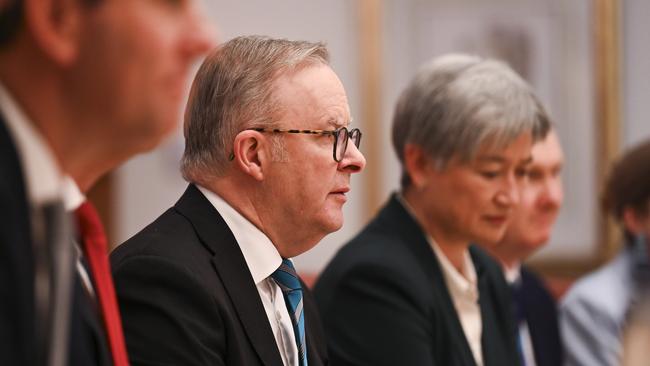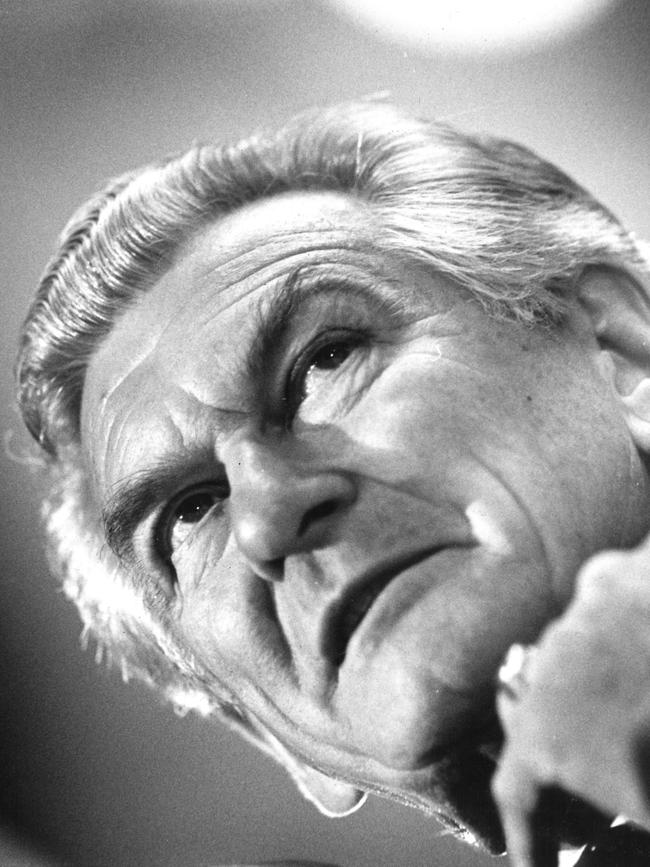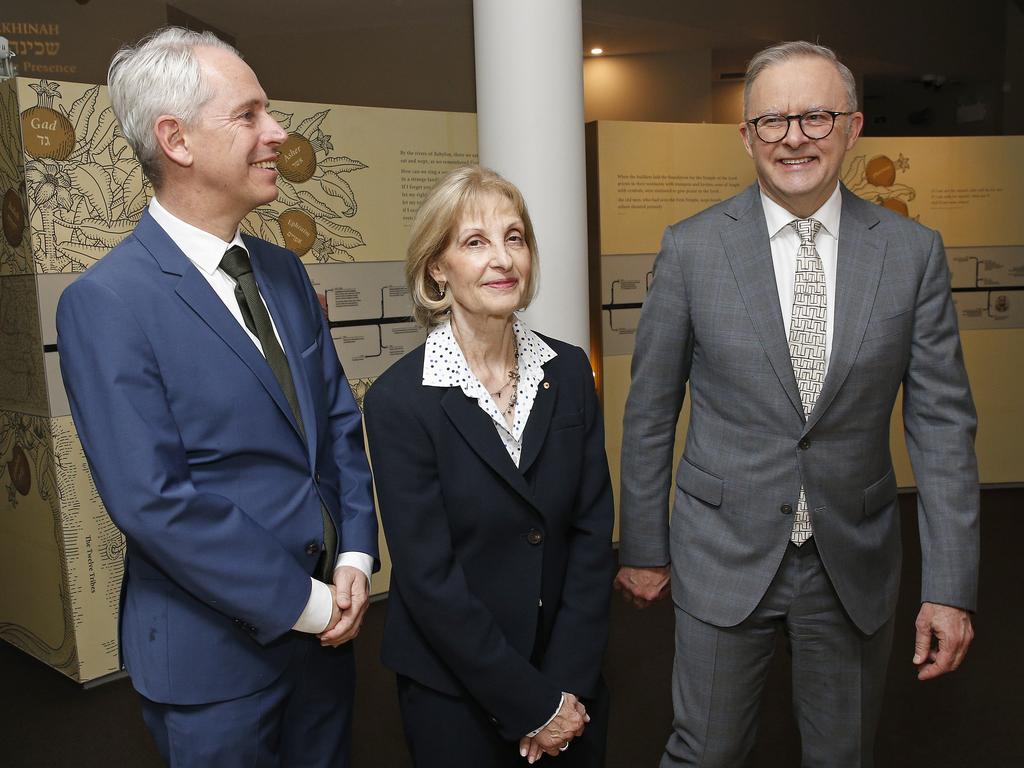
This is particularly evident in foreign policy, especially in relation to Israel and the Middle East, but also in defence policy. Why is it so cowardly?
It’s a government of the left that tried for a while to govern in the centre, but this doesn’t come naturally. Under pressure it reverts to a combination of instincts and the worst bits of advice from the Department of Foreign Affairs and Trade.
Anthony Albanese and Penny Wong come from the Labor Left. They are sincere, intelligent and would like to do their best for Australia. But they have no background or history of thinking about foreign affairs from a national security perspective, unlike great Labor internationalists from the Right such as Bob Hawke and Kim Beazley, or indeed Kevin Rudd. Their minds are not formed that way, their offices are not staffed that way. They’re not creatures – as Hawke and Beazley were especially – of the international security community.
Further, this is a weak government frontbench, led in a lackadaisical manner by the Prime Minister. It’s one thing to be a chairman of the board type, like Hawke or John Howard. It’s another thing to be seldom across the detail, letting ministers run off in all directions, often unaware of an issue or just unwilling to give direction. As in: Did the Treasurer ask his department to examine negative gearing? How would I know, I’m only the Prime Minister.
The Israel issue brings this to a head. Either the government supports Israel in its fight against Iran and the barbarism of Hezbollah and Hamas, or it doesn’t. The government is assailed by Peter Dutton on the right and the Greens on the left.
But here’s one thing you can say about Dutton and the Greens. They both know what they believe in.
No one can possibly follow the logic chopping, equivocations, endless adjustments, countless refusals to answer questions straightforwardly that have characterised the government’s positions.
Labor’s political weakness is feeding its foreign policy confusion. Albanese is no longer seen as a long-term Prime Minister. The party expects to lose its majority and at best be a minority government next term. It therefore expects the leadership to come up next term.

The obvious leadership candidates are Jim Chalmers, Tanya Plibersek, Tony Burke and, the faintest of chances, Richard Marles.
Marles is a tragic figure. He markets himself as a defence hawk and lifelong friend of Israel. But the only bit of the defence job he’s any good at is schmoozing overseas. He hasn’t delivered anything of consequence and has almost no traction in the community. He has some factional numbers in Victoria, but that’s about it. The most pro-Israel members of the federal cabinet have been National Disability Insurance Scheme Minister Bill Shorten and Attorney-General Mark Dreyfus.
It’s a pretty weak government frontbench (in truth, the same can be said of the opposition). The loss of Shorten, who is retiring from politics, is a huge blow for he is one of the very few cabinet ministers who has real national standing, a long record and some traction.
The leadership shadow contest is playing into foreign policy because of Labor’s ill-advised mechanism of giving the ever declining and unrepresentative rank-and-file party members a vote on the leadership, as well as the MPs.Any leader who takes a Hawke, or even Julia Gillard, style view of Israel won’t have a hope with Labor’s party membership.
Labor is in much more political danger from the Middle East issue than it perhaps realises. Albanese and his ministers have been exceptionally mealy-mouthed about the terrorist attacks on Israel, reluctant it seems to express any real support for Israel and not much even for the Australian Jewish community.
They seem to be scared of offending Australian Muslims and Greens voters, and their own party activists who detest Israel. The past couple of days, perhaps realising what a mess they’ve made, they’ve come up with a few more sympathetic statements, but how lame, late, coerced and wretched these look.

Figures from the Left of Labor are typically very reluctant standing against large demonstrations, whereas Hawke loved nothing more than to have anti-uranium and anti-American demonstrators outside a national Labor Party conference. He rightly observed that the hostility of such demonstrators to him would help his position with most Australians.
Uncomfortably for Labor, the politics of this issue may resemble the politics of the voice.
The Nine newspapers published a telling survey showing the vast majority of Australians, 59 per cent, are against the anti-Israel demonstrations.
As with the voice, the government is pursuing policies dear to an activist class, scared the activists might turn against them, and in the process alienating mainstream Australians. That 59 per cent opposed to the anti-Israel demonstrations is almost exactly the same percentage who voted No to the voice.
The lack of any conviction from the government is evident on Iran policy. The Iranian ambassador continues to post highly offensive tweets, calling for the Zionist plague to be wiped out, then extolling the great virtue of Hassan Nasrallah, the recently assassinated leader of Hezbollah, proscribed under Australian law as a terrorist group.
These tweets would be totally unacceptable from any Australian. Yet the government won’t expel the ambassador or effectively prevail on him to stop. He treats our government with contempt.
On the rare occasions when Canberra crosses anyone’s mind in Tehran, the reflection must be on what a pathetically weak, ineffectual, timid, scared nation we must be.

The government’s justification, which certainly mirrors advice it’s getting from DFAT, is that we have this uniquely wonderful and valuable dialogue with the Iranian government that the Americans especially value, and we mustn’t say anything to put it at risk. What absolute baloney that is.
For a dialogue to be valuable, both sides must value it. Yet the Iranians took Australian academic Kylie Moore-Gilbert hostage for more than two years. There’s no evidence having an embassy there got her out one day early. If any Australian official was central to her release it was former spy boss Nick Warner. The Iranians won’t take back failed Iranian asylum-seekers, though they’re supposed to under international law. And so on.
Expelling the Iranian ambassador doesn’t mean ending diplomatic relations, just that they would be conducted by a charge for a time. It does mean there are certain red lines for Australia.
DFAT is a competent and conscientious department operating within its own culture and under prevailing foreign affairs assumptions. A self-confident government imposes its own values on DFAT, not the other way around.
For that to happen, of course, the government must have values to start with.







If the Albanese government achieves the historic novelty of becoming the first one-term federal government in Australia since World War II, a large part of the reason will be simple cowardice.